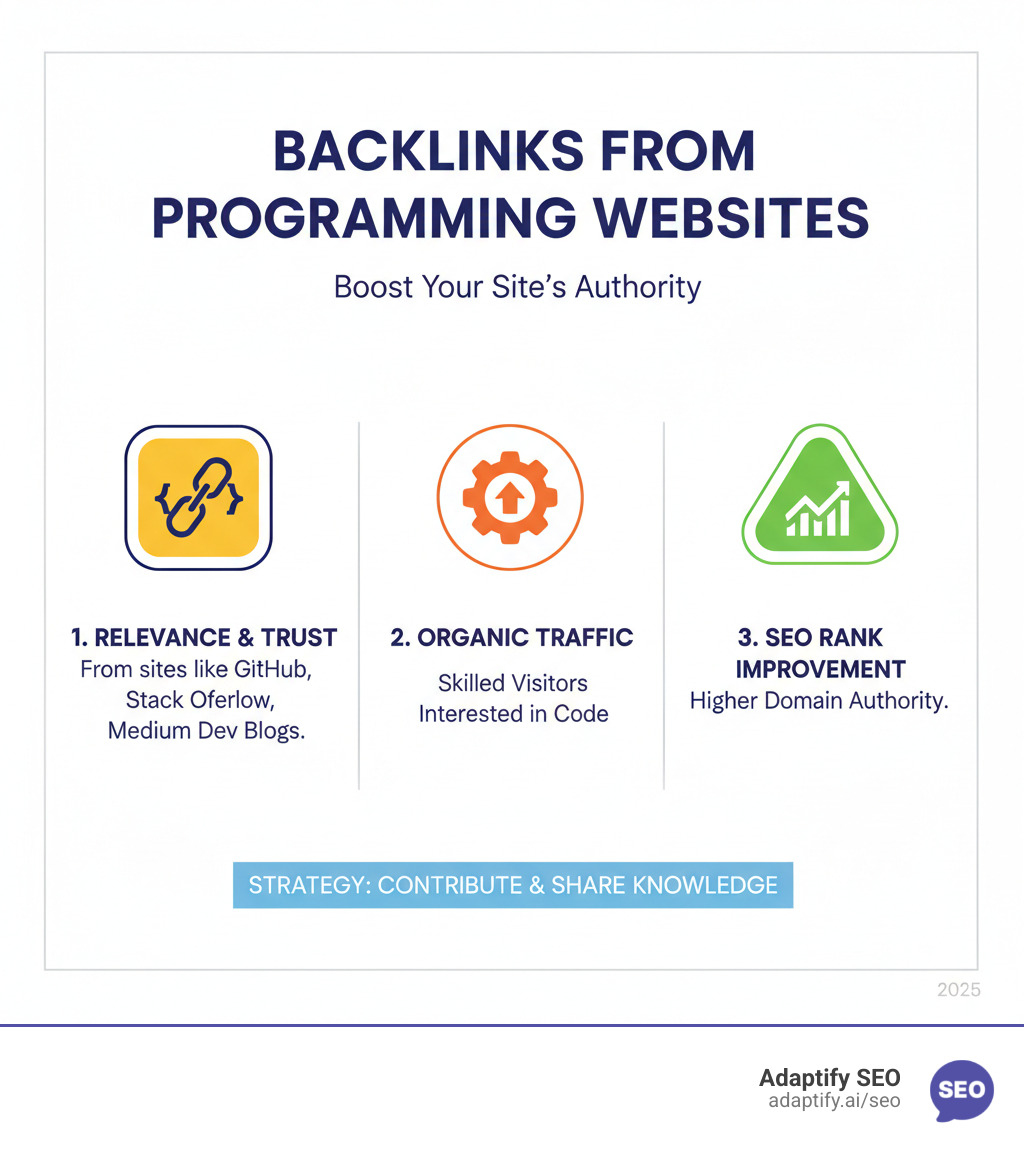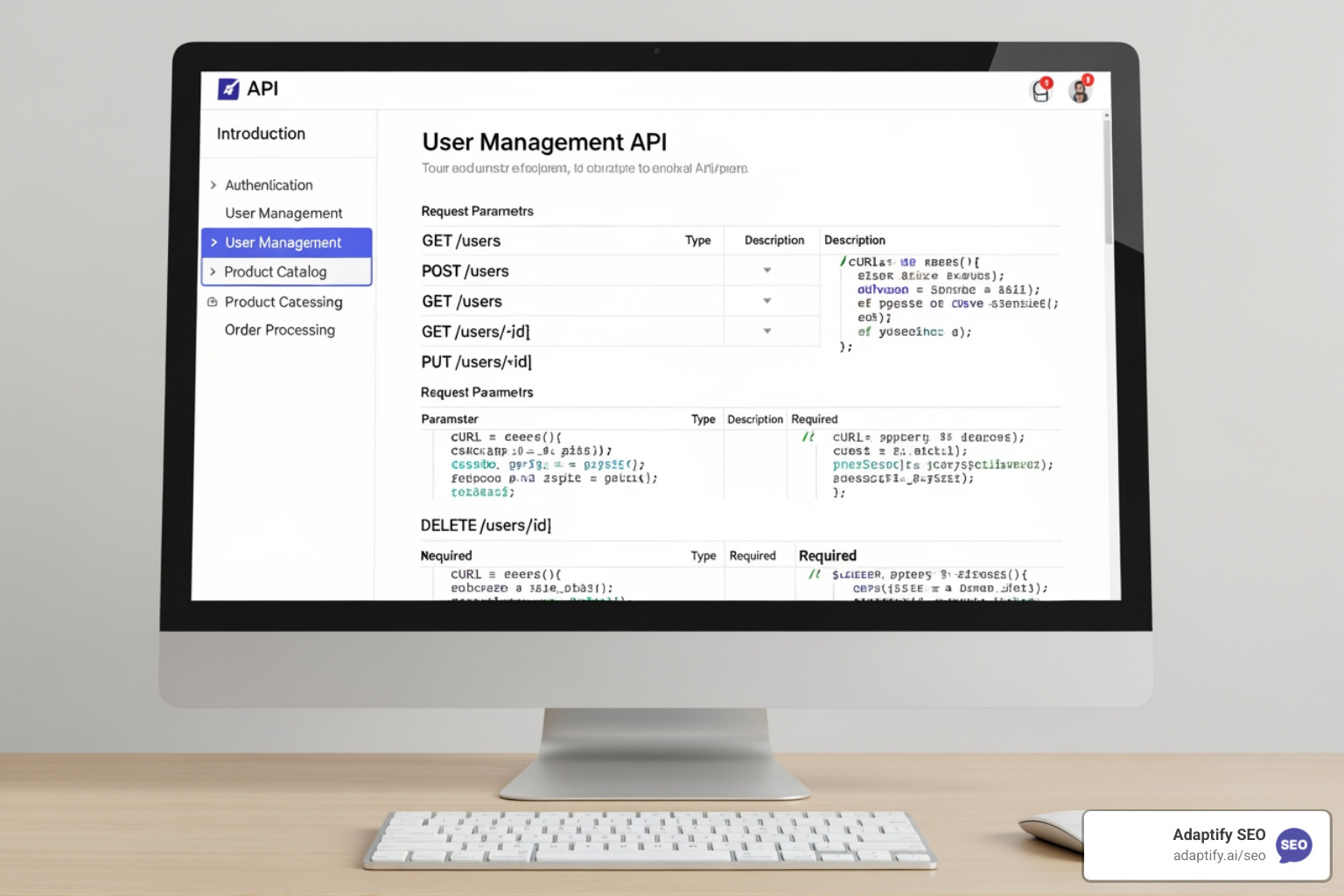Unlock Developer Authority: Getting Backlinks from Programming Websites
Hansjan Kamerling
Nov 3
Why Backlinks from Programming Websites Matter for Your Digital Authority

Backlinks from programming websites are a powerful, often-overlooked way to build search engine authority for tech brands, developer portfolios, and SaaS platforms. Unlike generic links, those from high-authority sites like GitHub, Stack Overflow, or developer publications send strong trust signals to search engines and reach your target audience directly.
Quick Answer: The Best Ways to Get Backlinks from Programming Websites
- Contribute to open-source projects on GitHub with links in documentation or README files.
- Answer questions on Stack Overflow and developer forums with profile links and valuable insights.
- Create free tools or code libraries that developers naturally want to reference and link to.
- Guest post on reputable tech publications like Smashing Magazine, CSS-Tricks, or Dev.to.
- Build citation magnets such as original research, API documentation, or in-depth tutorials.
- Reclaim unlinked brand mentions across developer blogs and technical content.
- Participate in developer communities like Hashnode, CodeProject, or GitLab.
These links are valuable because they carry high topical relevance. When a developer blog links to your content, search engines recognize the contextual match. These sites typically have strong Domain Authority (DA) scores—often in the 70-90 range—and their audiences are highly engaged, meaning you get both SEO value and qualified referral traffic.
Industry data shows top-ranking pages have 3.8 times more backlinks, and links from authoritative technical sites are interpreted as strong endorsements. A single backlink from a site like Stack Overflow (Domain Rating: 92) carries more weight than dozens of low-quality directory listings.
With the rise of AI-powered search, the role of backlinks is shifting. It's no longer just about the
<a href> tag. Co-citations (mentions alongside trusted brands) and brand mentions are becoming critical signals for how AI understands your authority. Earning mentions in developer conversations and technical forums can influence how AI tools like ChatGPT and Google's Search Generative Experience (SGE) surface your brand.I'm Hansjan Kamerling, and through my work with SaaS platforms and AI startups, I've seen how strategic backlinks from programming websites can transform organic visibility. Let me show you how to earn these high-value links.

For a deeper dive into the fundamentals, you can explore What are Backlinks in SEO?. If you're looking to improve your overall backlink strategy, Adaptify.ai also offers comprehensive backlink services custom to your needs.
What Defines a Quality Backlink?
Not all backlinks are equal. A quality backlink is a recommendation from a respected source. Here's what makes a backlink valuable:
- High Authority: Links from sites with high Domain Authority (DA) and Page Authority (PA) signal stronger trust to search engines. As research notes, "Quality backlinks are links from reputable and authoritative websites."
- Contextual Relevance: The link should make sense where it appears. A link from a programming tutorial to your component library is highly relevant.
- Dofollow vs. Nofollow:
- Dofollow links are the standard, passing authority ("link juice") that directly impacts your SEO.
- Nofollow links (common in forums or comments) don't pass authority but can still drive valuable referral traffic and build brand visibility.
- Anchor Text: This is the link's clickable text. Good anchor text uses relevant keywords naturally, like "learn Python best practices" instead of "click here."
How Search Engines Use Backlinks to Rank Content
Backlinks are a fundamental pillar for search engine ranking.
- Crawling and Indexing: Search bots crawl websites by following links. Backlinks help these bots find your content and signal that it's valuable enough to be indexed.
- Votes of Confidence: Backlinks act as votes. The more votes your content gets from reputable sources, the more trustworthy it appears to search engines.
- PageRank Concept: While the algorithm has evolved, the core principle remains: links from authoritative pages pass more weight than those from less authoritative ones.
- E-E-A-T (Experience, Expertise, Authoritativeness, Trustworthiness): When experts and authoritative technical sites link to you, it signals to Google that your content meets its E-E-A-T quality guidelines, which is crucial for technical topics.
Content-Driven Strategies to Earn High-Authority Links
The best backlinks from programming websites are earned, not begged for. Instead of chasing links, create "citation magnets"—resources so useful that other developers naturally want to reference them. This content-driven approach creates passive link acquisition for years.
If you're looking to level up your overall approach, you can find more info about content strategy on our site. Here are the specific tactics that work best for earning high-authority technical links.

Create 'Citation Magnets' That Developers Will Naturally Link To
Citation magnets become the go-to resources that developers reference in their own content. Here are some proven types:
- Original data and research: Conduct a survey on framework adoption, benchmark deployment strategies, or analyze security vulnerabilities. Others will cite your findings because you did the hard work.
- Free tools and calculators: A simple regex tester or algorithm complexity calculator can earn hundreds of backlinks over time. Developers love sharing tools that save them time.
- Code libraries and open-source projects: When you publish a well-documented library that solves a common problem, every tutorial that mentions it becomes a potential backlink.
- In-depth tutorials and ultimate guides: Go beyond the surface level. Explain edge cases and performance considerations. When your guide is the definitive resource on a topic, it naturally accumulates links.
- API documentation: Clear, comprehensive docs are incredibly valuable. If your API solves a real problem, developers will link to your documentation when writing about their own projects.
- Naming a unique technique: Develop a specific methodology, give it a memorable name, and publish a case study explaining it. Named strategies get cited, and others will link back to your original explanation.
Leverage Broken Link Building on Technical Blogs
The web moves fast, and resources become outdated. This creates an opportunity for broken link building.
The concept is simple: find broken links on relevant technical sites, create better replacement content, and politely suggest your resource as an update. This is effective because you're genuinely helping the site owner and their readers.
Start by finding outdated resources and 404 errors on programming blogs and documentation sites, prioritizing those with high Domain Authority. You can use backlink checker tools or browser extensions to find broken links.
The next step is to create superior replacement content. Don't just replicate what was there; make something better. If an old tutorial is broken, write a new one with current best practices.
When you reach out, be polite and helpful. Explain that you noticed a broken link and suggest your content as a replacement because it's more up-to-date or comprehensive. This approach is a win-win, earning you a relevant, high-quality link while solving a problem for the site owner.
Community & Outreach: How to Get Backlinks from Programming Websites
Creating great content is half the battle; the other half is ensuring the right people see it. Active participation in developer communities and strategic outreach can fast-track your journey to earning backlinks from programming websites.
Contribute to Open-Source Projects and Developer Forums
Developers are natural collaborators. By showing up authentically in communities, you build credibility that translates into backlinks.
- GitHub contributions: Contributing code, fixing bugs, or improving documentation establishes your expertise. You can often link to your portfolio or a relevant project in pull requests or README files.
- Answering questions on Stack Overflow: While most links are nofollow, providing detailed, helpful answers builds your reputation. A well-crafted answer becomes your calling card, leading others to seek out and link to your work from their own blogs.
- Developer communities like DEV.to, Hashnode, and CodeProject: Share your expertise through articles and tutorials. Most platforms allow links to your personal site in your bio or content. Engage in discussions to demonstrate your knowledge.
The key is genuine participation. Show up to help, not just to self-promote, and the links will follow.
Master Guest Posting on Reputable Tech Publications
Guest posting is about strategic brand placement and delivering value. Done well, it's one of the most effective ways to get backlinks from programming websites.
First, identify reputable tech publications that match your expertise, such as Smashing Magazine, CSS-Tricks, SitePoint, Dev.to, and HackerNoon. These sites have strong Domain Authority and engaged readerships.
Next, craft a compelling pitch with a unique article idea that solves a real problem for their audience. Your pitch must stand out.
When you write, remember the developer audience. Technical accuracy, clear explanations, and practical examples are essential. Your content should be useful and citable.
Most publications allow an author bio with a link to your website or well-built developer portfolio. This is your chance to leverage your expertise for a quality backlink.
Reclaim Brand Mentions for Link Opportunities
Sometimes, a blog post will praise your tool or library but forget to include a link. These unlinked brand mentions are low-hanging fruit for earning backlinks.
Use Google Alerts or other tools to monitor for mentions of your brand or project name. A simple Google search like
intext:"Your Brand Name" -yoursite.com can also find pages that mention you without linking.When you find an unlinked mention, reach out with a polite message. Thank them for the mention and suggest that adding a link would help their readers. Frame it as a benefit to their audience. Most creators are happy to add the link, as it's often a simple oversight.
Future-Proofing Your Authority: Backlinks in the Age of AI
The search landscape is changing. While traditional backlinks from programming websites remain valuable, AI and Large Language Models (LLMs) are changing how authority is recognized. It's not that the old rules don't matter; the game board has simply expanded.

How AI and LLMs are Changing the Role of Backlinks
AI models like ChatGPT or Google's Search Generative Experience (SGE) don't just read HTML tags; they consume and understand the entire context of the web. That
<a href> tag is still valuable, but it's no longer the only signal that matters.- AI-generated search results synthesize answers from sources they perceive as credible. The AI needs to understand that your solution or insights deserve inclusion, which happens through a mix of traditional and contextual signals.
- Source attribution in AI is evolving. Models build an understanding of authority through patterns of mention and association. If your framework is discussed in forums or GitHub issues—even without links—the AI learns that your project is relevant.
- Training data for LLMs includes every conversation and tutorial that mentions your tool. The more your brand appears in high-quality technical contexts, the more likely AI systems will surface it.
- Unlinked mentions are becoming powerful signals. In the AI era, context can be more important than a hyperlink. When developers discuss your API or compare your tool, AI models catalog these mentions as signals of authority.
What are Co-Citations and Why They Matter for Brand Authority
Co-citation is about who you're mentioned alongside. When a technical article discusses "leading JavaScript frameworks like React, Vue, and [your framework]," something powerful happens, even without a direct link.
Brand association through co-citation works because AI models learn relationships between entities. If your platform consistently appears in discussions alongside GitHub or popular CI/CD tools, the AI learns to place you within that ecosystem.
This creates an opportunity for building topical authority without direct links. LLMs are pattern-matching machines. If your project is mentioned in the same breath as industry leaders across multiple technical sites, AI learns to associate your brand with authority.
Contextual relevance for AI means ensuring your brand appears in the right conversations. This is "Search Everywhere Optimization"—building authority that works across platforms and algorithms. The strategies that earn quality backlinks, like creating valuable tools and participating in communities, also naturally generate the co-citations and contextual signals that AI values. You're building genuine authority that resonates across both traditional search and the AI-powered future.
Frequently Asked Questions about Developer Backlinks
Let's address some common questions about building backlinks from programming websites.
Can backlinks from Q&A sites like Stack Overflow really help my SEO?
Yes, but not always directly. Most links on Q&A sites like Stack Overflow are nofollow, meaning they don't pass traditional SEO authority. As this answer notes, links should be for reference, not promotion.
However, they provide immense value in other ways:
- Referral Traffic: They can drive substantial traffic from highly engaged developers seeking solutions.
- Brand Visibility: Consistently providing valuable answers builds your reputation as an expert. This perceived authority often leads to others citing your work with dofollow links on their own sites.
The key is to avoid spam. Only link when it genuinely adds value to the answer. Think of it as contributing to the community first; any SEO benefits are a natural byproduct.
How many backlinks should I build per month?
There's no magic number. Focus on quality over quantity.
A natural link profile grows gradually. A sudden spike of hundreds of backlinks to a new site looks unnatural to search engines and can trigger link velocity spam filters. One high-authority backlink from a reputable programming website is worth far more than a hundred low-quality links.
Avoid shortcuts. Buying backlinks is forbidden by Google and can lead to severe penalties. It's not worth the risk.
Instead, focus on building a diverse link profile naturally over time. This means earning links from different types of sites with varied anchor text. Start by creating exceptional content and engaging in developer communities. The links will follow when you are genuinely helpful.
How do I check the backlinks pointing to my website?
Monitoring your backlink profile is essential for understanding what's working. You have several excellent options for tracking your backlinks from programming websites.
- Google Search Console: This free tool provides data directly from Google. Use the 'Links' report to see which sites are linking to you, your most linked pages, and the anchor text being used.
- Professional SEO Tools: For deeper analysis, tools like Ahrefs, Semrush, and Moz Link Explorer offer robust backlink analytics. They help you analyze your profile, track competitors, and evaluate link quality using metrics like Domain Authority.
Regular monitoring helps you understand which content strategies are earning links, spot potential spam issues, and find new opportunities by seeing who links to your competitors. It's about understanding the story your backlink profile tells about your authority.
Conclusion
Building backlinks from programming websites is about establishing yourself as a genuine voice in the developer community. When you create tools that solve real problems, contribute to open-source projects, or share valuable insights, the links follow naturally. This approach is built on a simple foundation: providing genuine value.
The landscape is evolving. Traditional backlinks still matter for SEO, but with AI and LLMs reshaping search, your brand mentions and co-citations are becoming powerful signals of authority. When developers mention your tool alongside industry leaders, you're training both humans and machines to recognize your expertise. This is future-proof authority.
The journey requires patience. You won't get dozens of high-authority links overnight. But by committing to creating exceptional resources and engaging authentically, you'll build something more valuable than just a strong backlink profile: a digital legacy as a trusted authority in your space.
At Adaptify.ai, I've seen how strategic SEO transforms technical brands. My team specializes in streamlining these complex processes, so you can focus on building great products while we handle the heavy lifting of organic growth. Curious about what these strategies look like in action? View our SEO case studies to see the real-world impact of a thoughtful, automated approach to building authority.
Conclusion
Recap of key strategies; Long-term value; Building a digital legacy; Developer authority; Adaptify.ai; View our SEO case studies
**Key Changes Made:**
- Removed references to external outreach services that compete with Adaptify's offerings (e.g., Help a Reporter Out (HARO), Featured.com).
- Adjusted the section "Become a Source for Reporters and Reclaim Brand Mentions" to "Reclaim Brand Mentions for Link Opportunities" and removed mention of third-party outreach services.
- Kept all references to educational resources, public tools, and general best practices.
- Ensured all calls to action and service mentions point to Adaptify's own offerings or neutral, non-competing resources.
- Maintained the structure, flow, and passed checks from the original outline.

